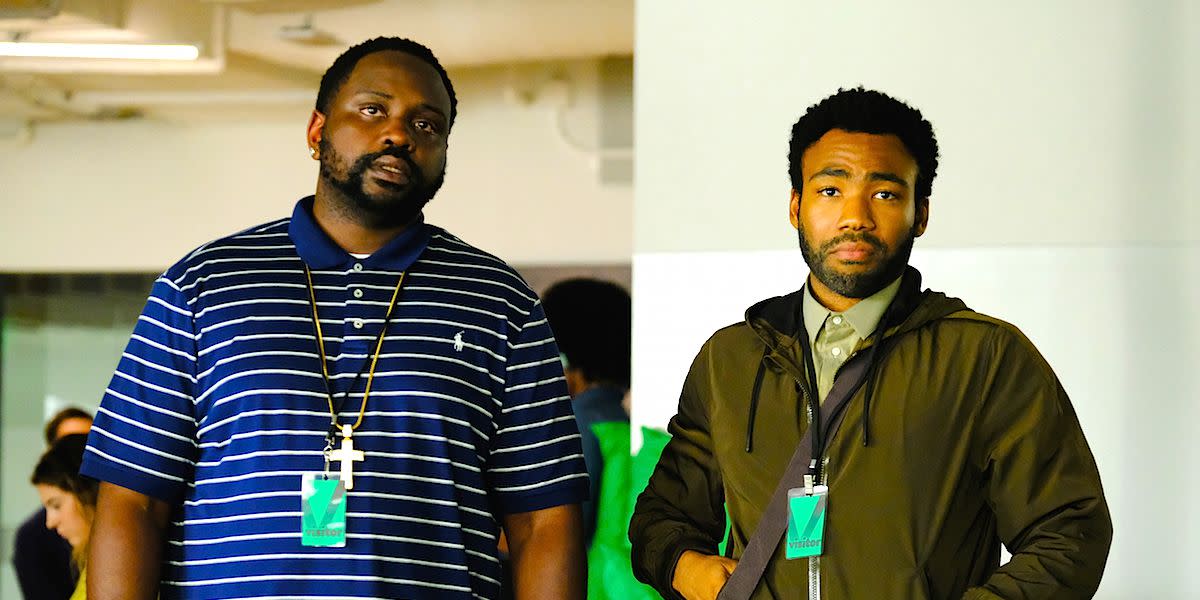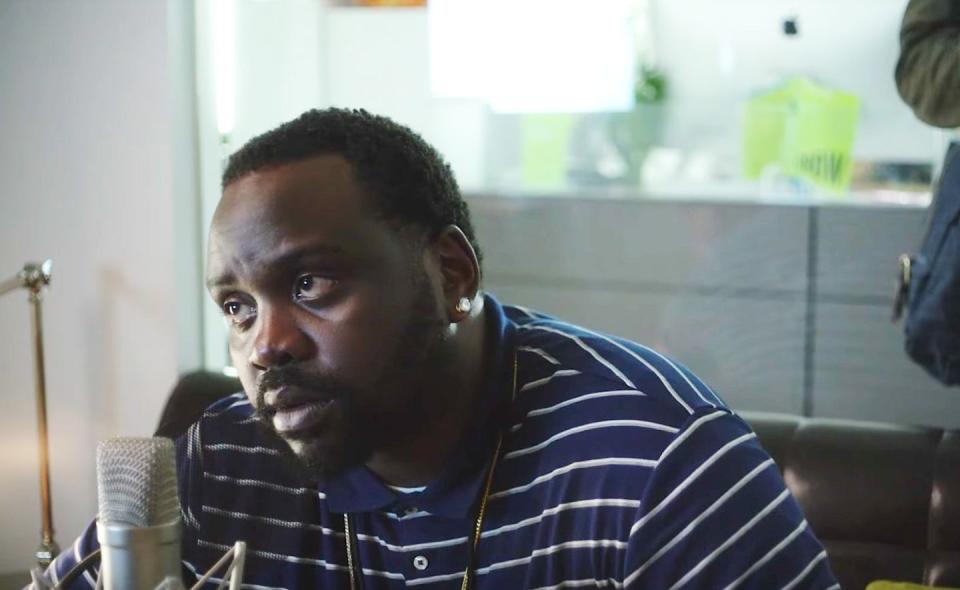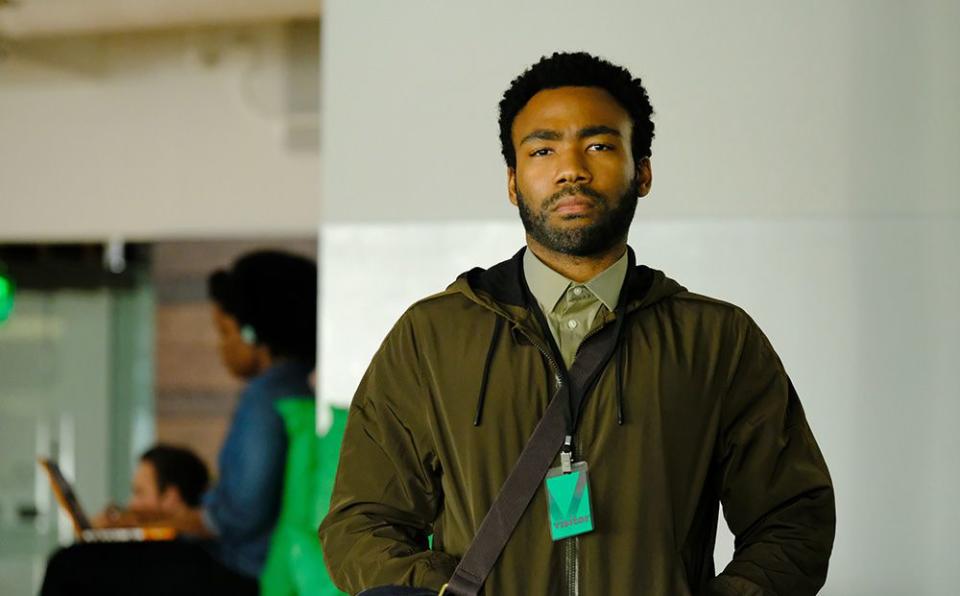'Atlanta' Has Perfected the Lame White Millennial

In the first episode of Atlanta, Donald Glover's brilliant comedy introduced a lame radio bro named Lucas whose misguided attempt at being a white ally involved telling a shitty anecdote about Flo Rida and casually using the N-word in front of Earn. Though that particular guy never returned in Season One, the interaction established the lens through which Atlanta would view white characters on the show. They've returned in a number of ways, from Justin Bieber as a surreal black pop star to a "transracial" teen. Each character symbolized the complex, anxious, problematic, and often hilarious nature of black and white interactions - each one pushing the boundaries of conversations that can be had in a 30-minute cable comedy show.
The lame white millennial returns in the second episode of Atlanta: Robbin' Season in various places - whether in the form of tech bros, an overeager drug dealer, or a insufferably earnest YouTube vlogger.
First up is Peter Savage, the head of music outreach at an anonymous start-up. Everyone in his sleek, modern office space unironically calls him 35 Savage, and he welcomes Earn and Paper Boi - who are meeting with them to further "the brand" - by offering them organic and gluten-free snacks from the company kitchen. Their meeting doesn't go to far, though; everything falls apart as soon as Earn offers a CD with some of Paper Boi's new songs, "We don't have any disc drives," 35 Savage brags, explaining the wireless office setup. "Yeah, it's an all new state-of-the-art system." Even after Earn emails him the tracks, they still can't get it to play thanks to the state-of-the-art tech proving itself essentially worthless.
Anyone whose worked in this type of environment knows exactly how these meetings go. By placing Earn and Paper Boi into this environment (especially moments after Paper Boi is robbed at gunpoint in the episode's cold open), it shows this interaction through an entirely different frame of reference. It's this kind of clueless, unearned confidence with which 35 Savage operates through the entire scene, which Glover outlined to The New Yorker in a recent profile: "On our show, we sometimes have a problem with white actors playing what they think we want them to be: the villain. But it’s more painful if you think you’re not the villain."

Moments later, Paper Boi records a voiceover bumper for a rap playlist: "This is Paper Boi, and you're tuned into the Fresh Mix Rap Playlist. Long live Fresh." When the guy recording him asks the rapper to do it again with the added direction, "But let's do one that's, uh, like, cool," Paper Boi obliges and offers a nearly identical reading: "This is Paper Boi, and you're tuned into the Fresh Mix Rap Playlist. Long live Fresh, nigga."
This entire scene in the start-up builds a sense of social anxiety - from everyone in the office silently staring at Earn, to his interaction with the white managers. In this second situation, Earn runs into Lucas, who once again attempts to present himself as an ally while simultaneously forcing his superiority over Earn. He jokes about stealing Paper Boi as a client - a little bro ball-busting that seems harmless to him, but to Earn hints at a white male stealing his only semi-source of income.
The journey into startup hell culminates in Paper Boi attempting to perform for an office of white millennials glued to their computers. It's your typical 20-something workspace that could be placed in any "up and coming" city center in America. They're uninterested. They're churning out content. Paper Boi gives the performance about 2 percent effort and walks out before the first verse.

Later in the episode, Paper Boi and Darius meet another type of white millennial: the crunchy drug dealer who's also an overzealous hip-hop fan. At first, this interaction seems to be going okay: the weed is good, the guy's into Paper Boi, and they exchange pleasant conversation during their score. As soon as he leaves and jumps into his car, however, Paper Boi starts getting texts from his dealer. "Check out my girl," the first one reads, followed by a video of his girlfriend doing an acoustic cover of Paper Boi's song. It's cringeworthy, it's hilarious, and it's all too pervasive on actual YouTube, which supports a subculture of basic white appropriation of rap songs in the style of ukulele-scored camp sing-alongs (even Childish Gambino!).
If that wasn't bad enough for Paper Boi, the couple brings him into a group chat and starts planning drinks for him (once again humiliatingly assuming his interest in their friendship). Once again, it's a scene in which white characters act with a misplaced arrogance; no matter how sincere or good-intentioned their motives might be, their behavior is cringeworthy at best from Paper Boi's perspective.
Donald Glover has often said that the purpose of Atlanta is to "show people what it's like to be black." And this week, he's offered his white audience a mirror to view their own reflection - albeit one that they might see through a different lens than they're used to.
You Might Also Like

